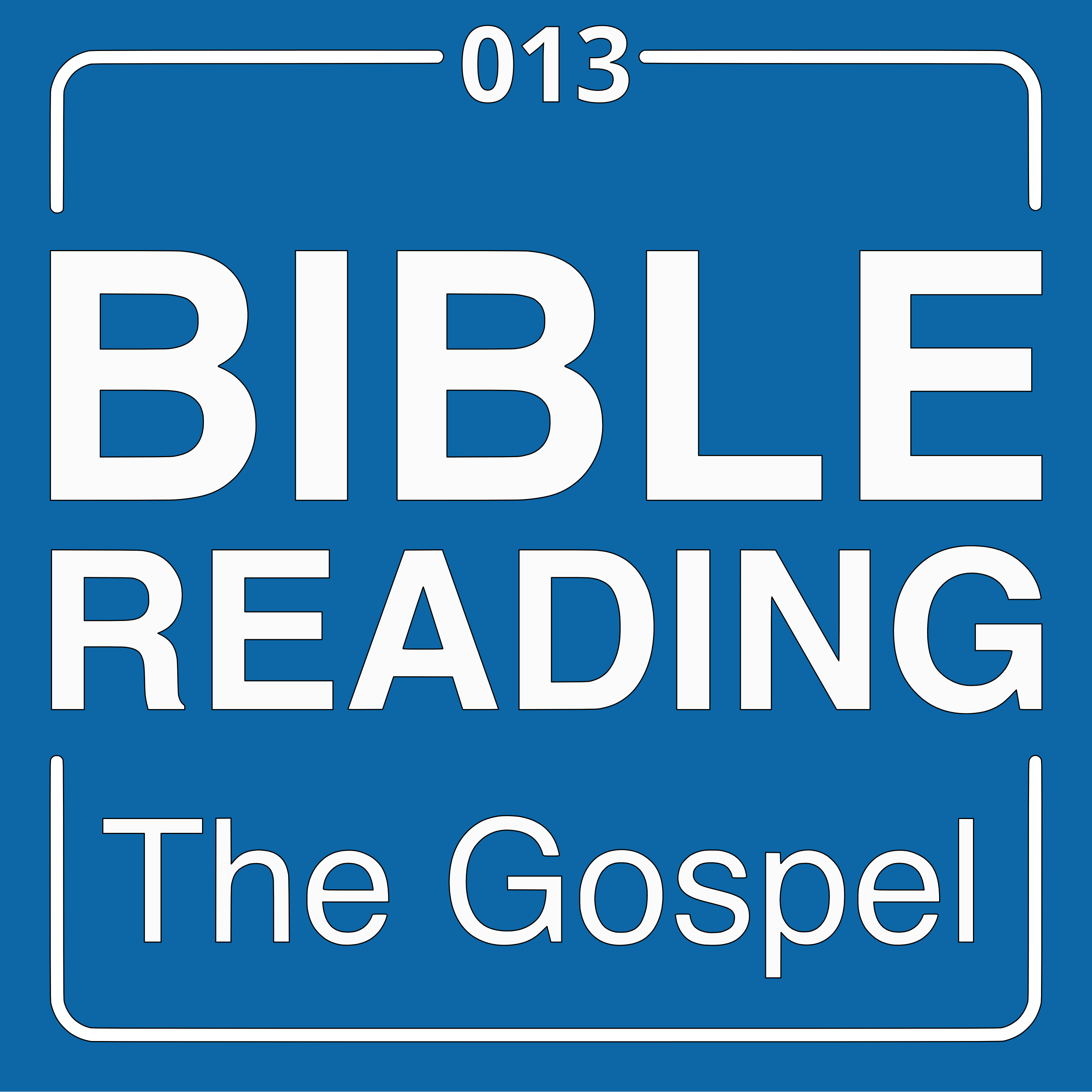Episode Transcript
[00:00:24] Speaker A: Hello, I'm Josh.
[00:00:25] Speaker B: And I'm Gabriel.
[00:00:26] Speaker A: And today on reading the gospel, we are studying the event, the pharisee and the tax collector. This comes from the Gospel of Luke, chapter 18, verse nine through 14. Grab your bibles and follow along with us as we read.
[00:00:44] Speaker B: He also told this parable to some who trusted in themselves that they were righteous and treated others with contempt.
Two men went up into the temple to pray. One a pharisee and the other a tax collector.
[00:01:02] Speaker A: The pharisee, standing by himself, prayed, God, I thank you that I am not like other men, extortioners, unjust adulterers, or even like this tax collector. I fast twice a week. I give tithes of all that I get. But the tax collector, standing far off, would not even lift up his eyes to heaven, but beat his breast, saying, God, be merciful to me, a sinner. I tell you, this man went down to his house justified rather than the other. For everyone who exalts himself will be humbled, but the one who humbles himself will be exalted.
So this is a very short parable that Jesus tells, but it's a very powerful parable. You have two men, Pharisee and a tax collector. One comes into the temple, and he's boasting, talking about all the good things.
[00:02:04] Speaker B: Pharisees were the leading religious party at those times.
They are equivalent to, let's say, conservative christians today, at least here in America. And they were really following the letter of the Bible.
And they were practical people. They were loved by people. They were teachers of the law, and they were respected in the synagogue. Tax collectors were on the other end of the religious spectrum. They were looked as those who sold their hearts, their souls, to the roman empire to collect taxes, unjust taxes from their own brothers and sisters. And on top of that, they were unjust because they're always asking for more to put into their own pockets.
Tax collectors were considered double sinners.
Here we have two extremes in this parable, and the end is unexpected. It's upside down. It's something what Jesus listeners would not even imagine.
[00:03:14] Speaker A: This Pharisee is pretty into himself. He's like, praise God. I'm not like these other people, especially that tax collector over there. I've met christians like this. You know, I am.
I think I've shared this one before. I've met christians who believe that they haven't sinned since some date. Like, I've been sin free since 1997. And it's very. Usually what they consider sin is a very narrow topic, like the Ten Commandments rigidly. So I've not murdered anyone today. I've not committed adultery. I've not stolen.
And you go through them. So therefore, I have not sinned and I'm perfect.
[00:03:59] Speaker B: And there is also this belief in the popular Christianity. So I don't steal. I don't take anyone's wife or husband. I'm a law abiding citizen, hardworking. I'm a good person.
[00:04:18] Speaker A: Yeah. So changing topics just a little.
Why was the Pharisee even in the temple? Because the tax collector came for forgiveness. What was the Pharisee doing there?
[00:04:34] Speaker B: Temple was the pride, national pride of the jewish nation.
They would go there to talk to God. So if you don't have anything to ask, you go there just to thank God. So there is always a reason to meet God, to talk to him. But it seems that this guy is a little bit off. Yeah, yeah.
[00:04:56] Speaker A: He's thanking God that he's not. That he's perfect. I'm not like them. I do everything I need to do.
[00:05:03] Speaker B: And even if your whole prayer is not like this, but if your prayer has a component like this or it is tainted by this kind of thinking, God might regard that prayer as this one in this parable.
[00:05:20] Speaker A: Yeah, I think this is the extreme, and Jesus is going to the extreme in this parable to make a point. But I think very often we can do this when we look around and think that we're better than other people.
You know, my family does gives more to the church. My family helps more. My family are. I do this, I'm wearing a better suit, or I'm more appropriately dressed to see God. We can do this in any of those thoughts. So it doesn't need to be as extreme as we have here.
[00:05:56] Speaker B: And sometimes we don't even have to say anything about ourselves. We just put other down or look down condescendently. And in that situation, we try to create a contrast with us that we are. That shows we're in the same situation.
[00:06:14] Speaker A: Yeah.
So the other, the tax collector, he's standing far off, not even lifting his eyes to heaven. This is the beating his breast. This is the sign of someone who's defeated, someone who is sorry, someone who is grieving what they've done, and they've come to seek mercy from God.
[00:06:41] Speaker B: It is the work of the Holy Spirit that convicts us of sin.
And it seems that the Holy Spirit was not that successful with the Pharisee. But the tax collector responded to the promise of the Holy Spirit.
He didn't even dare to make a list of his sins because he knew God was aware of his sins.
[00:07:08] Speaker A: And so they leave this place, and one of them is justified.
The other one is not. Now, how are we justified from our sins?
[00:07:23] Speaker B: Another word is counted as justice.
And that is in other translations.
When we realize that we have committed sin and that sin is horrible in the eyes of God, and whatever small sins we commit are offensive to God, and we realize that God is interested in our well being.
He wants to be not only just our remote savior from heaven, he wants to be our close friend. Walking with us, talking with us. In that situation, you realize that you have hurt a loved one, someone who is interested in your well being. And that is the moment when you express that sorrow. I'm sorry that I've done this.
Might have been unintentional those times, but now I become aware of the meaning of my sins.
[00:08:18] Speaker A: We're coming to God, and we're justified, not because of what we've done, but because of what God does and what Jesus did. At this point, it was still the future. He had not yet died on the cross.
But when Jesus died on the cross, we can have justification through him. Our sins can be paid for. The wages of sin is death. The Bible says so everyone, every sin that has been committed needs the payment of death.
And Jesus does this at the cross. And so this man goes away, the Bible says, went down to his house, justified. His sins have been forgiven. The Bible says, as far as the east is from the west, that's how far God removes the transgressions from him.
[00:09:07] Speaker B: In the Old Testament, major prophets, justification or righteousness? These two words are interchangeable, at least for the purpose of our study.
Justification and righteousness are compared with a robe.
And the old life full of sins is another kind of robe. And righteousness, or the process of being counted as righteous, is an exchange of robes. I took off the old one. I detest it. I put it in the garbage. I don't want to see it anymore. And I received this new life of Jesus Christ in the form of a white robe of righteousness. And I put it on, and I'm careful not to stain it, to keep it away from everything that can damage it.
[00:10:04] Speaker A: And so, in continuing that analogy with this parable, it would be like the Pharisee taking his sinful robe and trying to clean it himself. You know, getting out the Clorox, the bleach, trying to scrub on it, making sure it's clean, comparing it to other people's sinful robes. Hey, mine's not as dirty as yours.
[00:10:26] Speaker B: Yeah. I didn't even think that he saw his robe as, you know, dirty. Yeah, yeah, yeah.
[00:10:34] Speaker A: He saw it nice and clean. Like, I've got a clean robe, and.
[00:10:37] Speaker B: I didn't seen from 1997, as you said. Yeah.
[00:10:40] Speaker A: So I had a white bichon frise, and she was a very white dog until she went out in the snow. And when she went out in the snow, her fur looked yellow. And it's like, wow, she's not very white.
And I think when we're comparing ourselves to others around, we can look pretty good.
[00:11:04] Speaker B: To tax collectors.
[00:11:05] Speaker A: Yeah, to tax collectors, to sinners. When we go to the local jail and compare ourselves to the incarcerated, we can look pretty good. But when you go out in the white of snow, the son of God as white as snow, and we compare our robes, all of a sudden we realize just how dirty they are.
[00:11:24] Speaker B: In the book of James, the ten Commandments are compared with a mirror. And you look into that mirror, and the ten commandments express the character of God, his righteousness, in ten different specific situations of life. And every time we look into that mirror, we see that there is something that has to be removed, something that has to be cleansed, something that has to be improved. And Jesus Christ came to demonstrate practically as a human being, what does it mean to reflect God's character? In other words, to keep the ten Commandments not only in letter, but also in spirit and intention.
[00:12:02] Speaker A: Yeah. And the Bible uses the parable of smelting to describe this, that someone who is purifying gold or silver, they put it into a crucible and they heat it up. And as they heat it up, the imperfections come to the surface, and you take out the imperfections, you remove them from the perfect metal. From my understanding, you know, when the metal is perfect, when the smelter can clearly see their reflection in that metal, that all the impurities have come out. And this is what God is doing in us.
He's putting us in the fire. You know, we go through trials, we go through hard times. And each time it just chips a little bit away of self and sin and reflects Christ's character just a little bit more.
[00:12:54] Speaker B: And this process has two stages. There is an immediate stage that happens right away.
The tax collector went down from the temple from Jerusalem, justified.
And the first stage happens right away.
And I see this story as an application, as an illustration of the previous episode. In the first verses, in chapter 18, we have that widow, persistent widow. And Jesus Christ said in verse eight, I tell you, God will give justice to them. Speedily.
And sometimes we then see this word speedily being fulfilled in our lifetime. But here is the first stage of being counted as righteous happens speedily right away. You go on your knees, you confess your sins, and you are counted as righteous right away. Of course, there is the second stage. After being counted as righteous, you have to become righteous. But we'll talk about that in another episode.
[00:14:03] Speaker A: So this verse finishes, for everyone who exalts himself will be humbled, but the one who humbles himself will be exalted.
It is our job as Christ followers, as citizens of the kingdom of heaven, not to exalt ourselves, not to lift ourselves up, not to pat ourselves on the back, but to humble ourselves, to serve others, to put others first, and to realize that we are sinners, that we need Christ.
And when we come and we cry, God, be merciful, on me, a sinner, we can walk away knowing that God will justify us first. John one nine. If we confess our sins, he is faithful and just to forgive us our sins and to cleanse us from all unrighteousness. Let's pray. Father God, we are so thankful that the work of justification and the work of cleansing us is not a work that we do, but it's a work that you do.
[00:15:04] Speaker B: Amen.
[00:15:05] Speaker A: We thank you that the moment we cry out, God, be merciful to me, a sinner. Forgive me of my sins. I repent. The moment that those words come out of our mouth, we are justified.
But, Father, we thank you that you don't leave us there, that you create in us a clean heart, that you turn our desires away from sin and turn them to the good things. And so I pray that you will do that work in us each and every day so that we might not sin against you. We pray these things in Jesus name. Amen. Amen.



